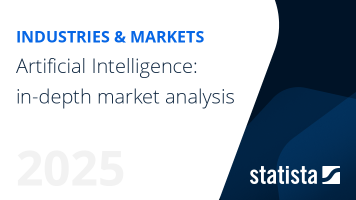Generative AI - Israel
Israel- The market size in the Generative AI market is projected to reach US$533.00m in 2025.
- The market size is expected to show an annual growth rate (CAGR 2025-2031) of 36.98%, resulting in a market volume of US$3.52bn by 2031.
- In global comparison, the largest market size will be United States (US$21.65bn in 2025).
Definition:
Generative artificial intelligence (AI) is a field of artificial intelligence that focuses on creating models and systems capable of generating new content, such as images, videos, music, or text. By training on large datasets, generative AI models learn patterns and structures within the data to produce novel and realistic outputs that mimic the original data distribution. Using techniques like generative adversarial networks (GANs) or variational autoencoders (VAEs), generative AI has the potential to enhance creativity, enable data synthesis, and revolutionize various industries including art, entertainment, and content creation.
Additional Information:
The market comprises two key performance indicators: market sizes, and market sizes by industry. Market sizes are generated by the funding amount of Generative Artificial Intelligence companies. Key players of the market include companies such as Open AI, NVIDIA DeepL Learning and Google (Magenta, DeepDream).
For more information on the data displayed, use the info button right next to the boxes.
- Applications of generative artificial intelligence to create new content, such as images, music, and text, which is indistinguishable from human-generated content.
- Non-artificial intelligence applications of generative systems, such as procedural content generation in video games, which do not involve machine learning or creativity.








